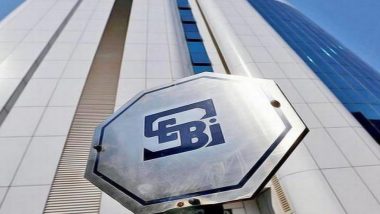Mumbai, May 3: Stock Market regulator Securities and Exchange Board of India (SEBI) had earlier this week, banned the National Stock Exchange (NSE), the largest stock exchange in India, from accessing the capital markets for six months. The regulator's decision comes after NSE violated the Stock Exchanges and Clearing Corporation (SECC) regulations. The watchdog has been probing alleged lapses in high-frequency trading offered through NSE's co-location facility since a long time now. Reports inform that after several irregularities came to light, SEBI ordered the NSE to pay over Rs 625 crore for giving unfair access and speed to certain traders. SEBI Slaps Rs 10 Lakh Fine on PRM Power for 'Non-Genuine Trades' in Illiquid Stock Options.
According to reports, NSE's two former chief executive officers-Ravi Narain and Chitra Ramkrishna, have been asked to pay 25 per cent of respective salaries drawn during a certain period. In a 104-page order, SEBI said the Narain and Ramkrishna have also been prohibited from "associating with a listed company" or a Market Infrastructure Institution or any other market intermediary for a period of five years.
Here's Why SEBI Banned NSE
The co-location case dates back to 2015. Reports inform that a whistleblower, in a letter to SEBI had alleged that NSE was giving a few high-frequency traders and brokers preferential access to few of its traders. SEBI has fined NSE with over Rs 625 crore for misusing its co-location facility with which it favoured several brokers to make illegal gains by using unauthorised trading software, networks and servers. These servers were in the same room where the exchange’s main trading servers were located, thus giving unfair access to certain traders.
The SEBI Order
With SEBI's ban order, if NSE had any plans to go public and raise money from the markets, it cannot do it for the next six months. The SEBI order said, "The bourse "shall disgorge an amount of Rs 624.89 crore... along with interest calculated at the rate of 12 per cent per annum from April 1, 2014 onwards to the Investor Protection and Education Fund (IPEF) created by SEBI".
After the incident came to light earlier this week, SEBI asked the NSE not to introduce any new derivatives contracts for the next six months. It also urged the NSE to carry out system audit at frequent intervals after thorough appraisal of all the technological changes.
After SEBI's order, NSE MD & CEO Vikram Limaye on Wednesday said that NSE is examining the SEBI order and will decide its future course of action. The NSE chief also said the SEBI order will have no bearing on the existing trading, business and on investors and the issue of co-location is more related to technology, control and processes during the period 2010-14.
(The above story first appeared on LatestLY on May 03, 2019 04:23 PM IST. For more news and updates on politics, world, sports, entertainment and lifestyle, log on to our website latestly.com).













 Quickly
Quickly












